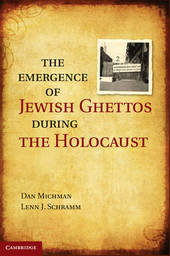
|
The Emergence of Jewish Ghettos during the Holocaust
Hardback
Main Details
| Title |
The Emergence of Jewish Ghettos during the Holocaust
|
| Authors and Contributors |
By (author) Dan Michman
|
|
Translated by Lenn J. Schramm
|
| Physical Properties |
| Format:Hardback | | Pages:200 | | Dimensions(mm): Height 216,Width 140 |
|
| Category/Genre | The Holocaust |
|---|
| ISBN/Barcode |
9780521763714
|
| Classifications | Dewey:940.5318 |
|---|
| Audience | | Professional & Vocational | |
|---|
| Illustrations |
10 Maps; 4 Halftones, unspecified; 5 Line drawings, unspecified
|
|
Publishing Details |
| Publisher |
Cambridge University Press
|
| Imprint |
Cambridge University Press
|
| Publication Date |
31 January 2011 |
| Publication Country |
United Kingdom
|
Description
This book is a linguistic-cultural study of the emergence of the Jewish ghettos during the Holocaust. It traces the origins and uses of the term 'ghetto' in European discourse from the sixteenth century to the Nazi regime. It examines with a magnifying glass both the actual establishment of and the discourse of the Nazis and their allies on ghettos from 1939 to 1944. With conclusions that oppose all existing explanations and cursory examinations of the ghetto, the book impacts overall understanding of the anti-Jewish policies of Nazi Germany.
Author Biography
Dan Michman is Professor of Modern Jewish History and Chair of the Arnold and Leona Finkler Institute of Holocaust Research at Bar-Ilan University, Ramat-Gan. He is Chief Historian at the Yad Vashem International Institute of Holocaust Research. His work has been published in 11 languages and deals with modern Jewish history and the history of Dutch Jewry, with a focus on the Holocaust. His books include Bimay Shoa Ufkuda (Days of Holocaust and Reckoning), Het Liberale Jodendom in Nederland, 1929-1943 (Liberal Jewry in the Netherlands 1929-1943), and Holocaust Historiography: A Jewish Perspective: Conceptualizations, Terminology, Approaches and Fundamental Issues, and he is co-author of Pinkas: Geschiedenis van de joodse gemeenschap in Nederland (Pinkas: The History of the Jewish Community in the Netherlands). Volumes he has edited include Post-Ziyonut ve-Shoa (Post-Zionism and the Holocaust); Belgium and the Holocaust: Germans, Belgians, Jews; Les intellectuels face a l'affaire Dreyfus: alors et aujourd'hui (Intellectuals Responding to the Dreyfus Affair: Then and Now; co-edited with Roselyne Koren); Remembering the Holocaust in Germany, 1945-2000: German Strategies and Jewish Responses; Encyclopedia of the Righteous Among the Nations: Belgium; Hashoa Bahistoriya Hayehudit: Historiografiya, Toda'a u-Farshanut (The Holocaust in Jewish History: Historiography, Consciousness, Interpretations); and Holocaust Historiography in Context: Emergence, Challenges, Polemics and Achievements (co-edited with David Bankier).
Reviews"This profound, insightful, and surprising book proves the extraordinary value of asking the right questions. Michman's reassessment of the ghettos unsettles key assumptions about the Holocaust: about the role of antisemitism; links between ghettoization and mass murder; differences across Europe; and relations between the German leadership and the people who implemented anti-Jewish measures on the ground. Ghettos, Michman shows, were enormously significant, but they were neither uniform nor an inevitable step toward annihilation. Everyone interested in the Shoah, how it occurred, and how it has been understood, should read this book." -Doris L. Bergen, University of Toronto "Within a tight compass and with startling clarity, Dan Michman succeeds in shattering one misconception after another about the 'ghettos'. They were not a uniform phenomenon and were not a prequel to the genocide. They were not even necessary for it. Yet, he shows how they were rooted in traditional anti-semitism and, especially, the German phobia towards East European Jews. His forensic analysis of how the concept evolved and how it was applied in increasingly violent situations will compel every student and scholar to think twice before using the term. From here on, the standard histories will have to be re-written." -David Cesarani, Royal Holloway, University of London "By writing the first comprehensive study on the emergence and character of the ghetto phenomenon in the Third Reich, Dan Michman revises some key notions about the Holocaust. Going beyond an administrative and organizational history of the ghetto, Michman offers an erudite and sophisticated analysis of the semantic, linguistic, and cultural contexts of the term ghetto and its actual use in Nazi policy. The value of this approach is evident. By probing into where and when the idea originated among the Nazis and why its application was so uneven and complex, he opens new questions about the persecution and extermination of the Jews." -Alon Confino, University of Virginia "Dan Michman's investigation of the emergence and evolution of the idea of the ghetto among Nazi policymakers is a masterpiece of historical detective work that convincingly undermines decades-old assumptions. Among other things, it shows how Nazi Jewish policy unfolded in at least some measure in response to anticipated behavior by Jews. The most experienced scholars of the Holocaust will find much new in this work." -David Engel, New York University "Dan Michman casts a great deal of new light on the emergence and function of the ghettos: on the pre-history of ghettos, the different applications of the term, and the variety of concepts of ghetto that developed in the Third Reich. This is an important contribution, which only someone with Michman's linguistic gifts could have accomplished." -Ian Kershaw, University of Sheffield "...Dan Michman's analysis, based on very close reading of key documents, is a powerful challenge from a formidable historian for scholars to rethink long-held assumptions regarding the place of ghettoization in Nazi thinking and policy." -Norman J. W. Goda, The Journal of Modern History
|